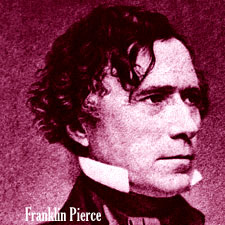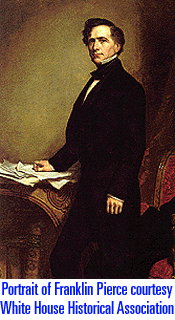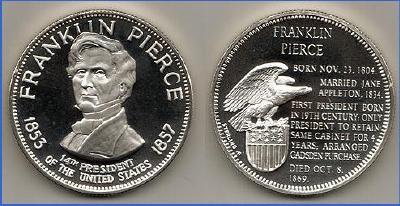|
FRESH STUFF DAILY |
|
|
||
|
|
||
|
|
||
|
SEE ALL SIGNED BOOKS by J. Dennis Robinson click here |
||
New Hampshire’s only successful Presidential candidate was among the most unpopular in the nation’s history. But he found Portsmouth a friendly and safe harbor. Pierce had served here as a young lawyer and returned toward the end of his single term. Following the Civil War too, Pierce found solace here by the sea.
READ: Presidents on bottle tops Our only NH-born chief executive, Franklin Pierce (1804 - 1869) knew the Seacoast better than his three presidential predecessors -- Washington, Monroe and Polk. Pierce and his Bowdoin College pal Nathaniel Hawthorne were known to visit the Isles of Shoals. Hawthorne reluctantly agreed to write his friend's campaign biography. Who could lose with a slogan like, "We Polked you in 1844, We'll Pierce You in 1852"? Never a popular choice, Pierce ironically ran for president against another New Hampshire candidate, J P Hale of nearby Dover, who opposed him as the Free Soil candidate in 1852. Pierce took over a country half the size of the one we know today as our national growing pains were at their peak. His own presidential troubles began when his son was killed by a train as the new President and his wife Jane arrived in Washington, DC. Too grief-stricken to attend the inauguration, she stayed out of public view for the next two years. -- JDR FRANKLIN PIERCE IN PORTSMOUTH
Franklin Pierce, a desperate choice by the Democrats for the 1852 presidential nomination, surprised even himself by winning the election. He served a single term that historians frequently consider a major step toward the Civil War. Nearing the end of his term in 1856, with James Buchanan the Democratic choice to succeed him, President Pierce visited his home in Concord, NH. He arrived in the state capital on October 3, and thousands thronged the streets to welcome their Native Son. The Chronicle reported: "The President was dressed in black-though he stated, in answer to many friendly inquiries, that his health was good, he looked pale, but seemed highly gratified by the reception he had received." That same week Portsmouth was staging a two-day centennial of the release of its first newspaper, the NH Gazette, so President Pierce was belatedly invited. Pierce couldn't work the event into his schedule, but promised by telegraph to visit the Seacoast on Wednesday October 8, before returning to Washington. Portsmouth Mayor Richard Jenness immediately sent a committee of three to Concord to accompany the president to Portsmouth. A Peaceful Visit on the Edge of War Despite the lack of public notice, a decent hastily-assembled crowd of gentlemen and women were on hand to meet the presidential train at 1p.m. Following a 21-gun salute, the President ascended to the platform, in front of which a quasi-military outfit, the Buchanan Guards, had been drawn up and came to present arms. Mayor Jenness gave a mercifully brief speech of welcome -- steering clear of unpopular topics. Even in his own home state, Franklin Pierce was not always loved. He said: "Whatever differences of opinion there may have been in regard to some of the measures of your administration, none will deny that it has been distinguished for industry, economy and a marked and successful foreign policy, as well as fidelity to the great fundamental Principle that lies at the base of this government, the right of the people to govern them- selves. Strike from the fair fabric of this union this foundation principle, and the beauty and symmetry of the whole procedure is gone forever ." Before going any further it should be emphasized that Franklin Pierce was the only president of the United States who actually ever lived in Portsmouth -- even though it was only a short span of years. His acquaintance with the town had begun after his graduation from Bowdoin College in 1824. He came to Portsmouth to read law, as was the custom then. Upon being admitted to the bar, he returned to the Concord area from whence he had come. Pierce had arrived in town a decade after the departure of Daniel Webster. Both men had schooled under the city's revered lawyer Levi Woodbury. It was Woodbury who had introduced President Polk on his visit to Portsmouth in the 1840s. Following in the footsteps of Daniel Webster who had lived in Portsmouth a decade earlier, Pierce also worked with the popular Judge Levi woodbury. In his brief remarks in 1856, President Pierce was able to touch on this familiar topic. According to the Portsmouth Chronicle: "The president was justified in extolling Levi Woodbury because it's quite probable that but for his untimely death in 1851, Woodbury might have been elected president, and not Pierce." The Chronicle added: "The president alluded in feeling terms to Portsmouth as the home of (John) Langdon, Col. (William) Gardner, Capts. (Thomas) Manning and Elijah Hall, true patriots and noble men. He spoke of his early acquaintance with Col. Gardner, whose lessons of wisdom and patriotism he could never forget." Pierce had asked Mayor Jenness to keep his visit low-key so that he might visit a few old friends. With the formalities of the welcome out of the way, the presidential party left the depot area and, escorted by the Buchanan Guards, went to the Rockingham House, site of the current Rockingham Hotel, where he could get together with old chums. CONTINUE Franklin Pierce Visits Portsmouth
Homage to the Navy In the evening there was a ball at the Navy Yard. Pierce returned to the Rockingham about midnight and was the last president to spend a night in Portsmouth until Harry S. Truman stayed over in October, 1952. Truman, however, slept aboard his private railroad car down at the depot, the same spot where Pierce had spoken nearly a century before. No presidential trip to Portsmouth would be complete without a tour of the Piscataqua, a tradition begun by George Washington who spent four days in the city. The following morning, Pierce, Mayor Jenness, and friends of the president went to the Navy Yard landing, where they boarded Commodore Newton's boat for the trip down river to the frigate Wabash. Pierce did not tour the Yard, but received the traditional military salute as he passed by. The yards and rigging of the USS Wabash were fully manned, and the frigate and Ft. Constitution exchanged salutes before breaking out a goodly feast. The Chronicle said: "The Wabash weighed anchor and set sail about 5 o'clock p.m. She was heartily cheered by a large number of people who had collected on or about Ft. Constitution to witness her departure. The cheers were responded to by the sailors from the rigging of the frigate and salutes were exchanged between the Fort and the frigate. The President expressed much gratitude at his reception here, which indeed was a cordial one, and doubtless agreeable to all parties." Ex-President Goes Tourist As unpopular as he was elsewhere, Pierce held pleasant memories of Portsmouth. The summer after his presidency, Franklin Pierce and his wife came back to Portsmouth and put up at the Rockingham. The couple planned to spend only the month of August, but were still here in October when the Rockingham County Agricultural Fair was held on Auburn Street, now Richards Avenue. Ex-President Pierce took part in the fair parade and the local paper taunted local politicians when some rode in carriages while the former chief executive walked the full parade route. In the years before his death (October 8, 1869) ex-President Pierce was a frequent visitor to Portsmouth and the Seacoast. The Civil War angered him; he saw it as a direct blow against his ideas of States Rights. As the war that many blamed on him came and went, Pierce found solace as he had done in his earlier years on the Seacoast and out on the peaceful Isles of Shoals. By Ray Brighton, Edited by SeacoastNH.com. Reprinted by permission of the publisher. © 1994 Portsmouth Marine Society. First published on SeacoastNH.com in 2000. Updated 2005. BUY THE BOOK : Please visit these SeacoastNH.com ad partners.
News about Portsmouth from Fosters.com |
| Saturday, April 20, 2024 |


|
Copyright ® 1996-2020 SeacoastNH.com. All rights reserved. Privacy Statement
Site maintained by ad-cetera graphics

 Smuttynose Murders
Smuttynose Murders





















